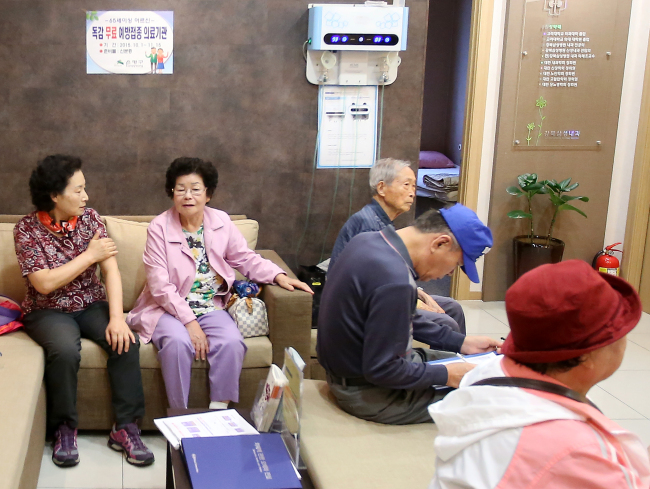Low transfer payments push elderly into poverty in Korea: report
By 이다영Published : Oct. 20, 2015 - 17:38
Transfer payments, such as social retirement benefits and public pension payments, only make up about 28.8 percent of the average income of Korean elderly, with almost 50 percent of the elderly living below the poverty line, a newly released report showed.
The high poverty rate and inadequate public transfer payments mean that most of the Korean elderly must stay employed -- even if they don’t want to -- or financially depend on family members or children in order to live above the poverty line, claimed the report.
The research paper, authored by Lee Soon-ah from the National Pension Research Institute, showed that 46.9 percent of the Korean elderly population lived in poverty -- defined as having income of less than half the median national income -- as of last year. The number was significantly higher than those of other developed nations, such as Norway (1.5 percent), England (7.9 percent), the U.S. (19.3 percent) and Taiwan (26.6 percent).
The high poverty rate and inadequate public transfer payments mean that most of the Korean elderly must stay employed -- even if they don’t want to -- or financially depend on family members or children in order to live above the poverty line, claimed the report.
The research paper, authored by Lee Soon-ah from the National Pension Research Institute, showed that 46.9 percent of the Korean elderly population lived in poverty -- defined as having income of less than half the median national income -- as of last year. The number was significantly higher than those of other developed nations, such as Norway (1.5 percent), England (7.9 percent), the U.S. (19.3 percent) and Taiwan (26.6 percent).

In countries such as Denmark, Poland, the U.K., Finland, Australia and Canada, public transfer payments, such as pension payments, retirement benefits and living allowance, accounted for 70 percent of the average income of the elderly population. In Korea, however, public transfer payments only made up 28.8 percent of the average income of the elderly, while private pension payments and savings accounted for 19.8 percent of the income.
In most European countries examined for the paper, including Denmark, Norway and Finland, such private savings or pension payments only accounted for about 0.1 to 0.4 percent of the average elderly income. “The statistics show that families and individuals, rather than the state, are caring and providing for the country’s aging population,” said researcher Lee in the paper. “The government must make sure all elderly individuals can benefit from the country’s welfare benefits regardless of the financial status of their family members or children.”
Under the current law, all adult Koreans are legally obligated to financially support their spouses, parents and parents-in-laws. Accordingly, the recipients of the state welfare payments lose a portion or all of their allowance if any member of their immediate family -- spouse, child or child-in-law -- has a regular monthly income, depending on how much they make.
Critics of the law have claimed the current system has in fact caused family discord among people who live below the poverty line, as they would purposely cut contact with one another to prove they have no family members to rely on, therefore becoming eligible for the state allowance payments given to those who make less than the government-designated minimum cost of living of 603,403 won ($534.25) a month.
As of this year, there are some 6.62 million senior citizens in Korea, accounting for 13.1 percent of the entire population. With the country’s low fertility rate, coupled with the high ratio of baby boomers entering retirement age, Statistics Korea expects the elderly will make up 15.7 percent of the population in 2020 and 40 percent by 2060.
By Claire Lee (dyc@heraldcorp.com)







![[KH Explains] How should Korea adjust its trade defenses against Chinese EVs?](http://res.heraldm.com/phpwas/restmb_idxmake.php?idx=644&simg=/content/image/2024/04/15/20240415050562_0.jpg&u=20240415144419)










![[Today’s K-pop] Stray Kids to return soon: report](http://res.heraldm.com/phpwas/restmb_idxmake.php?idx=642&simg=/content/image/2024/04/16/20240416050713_0.jpg&u=)